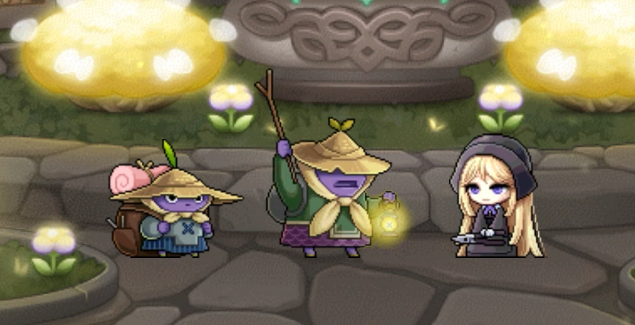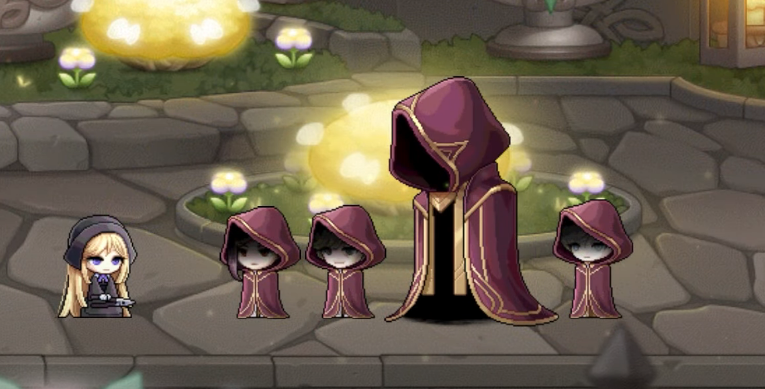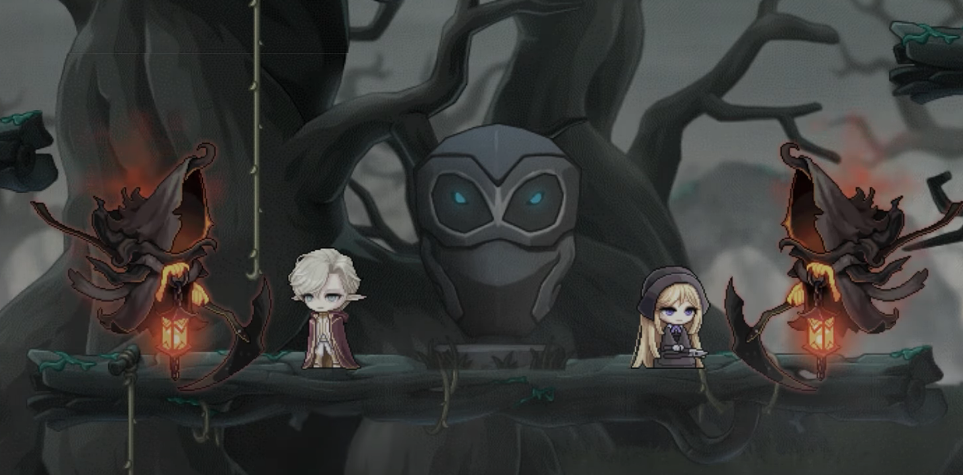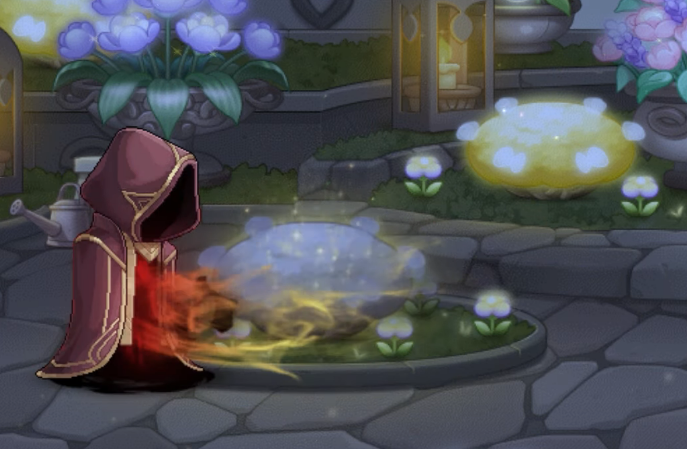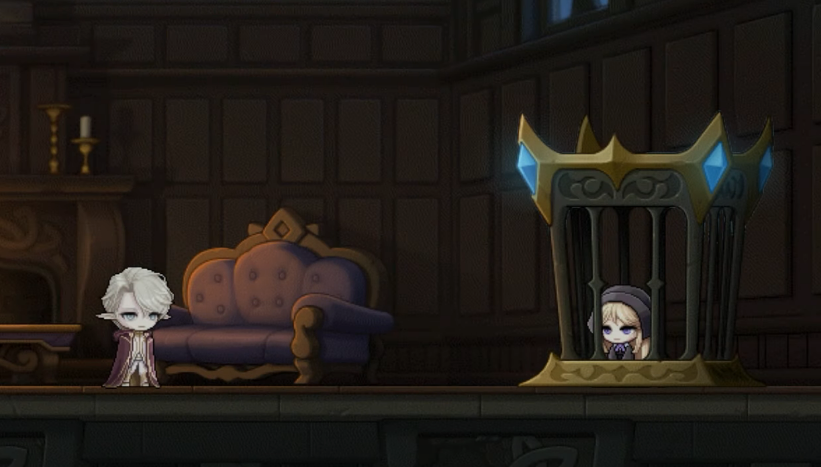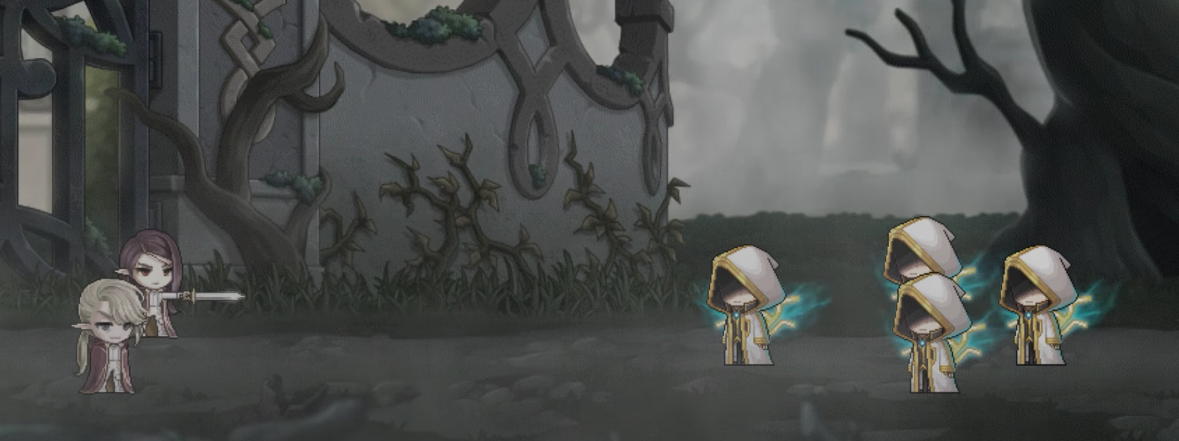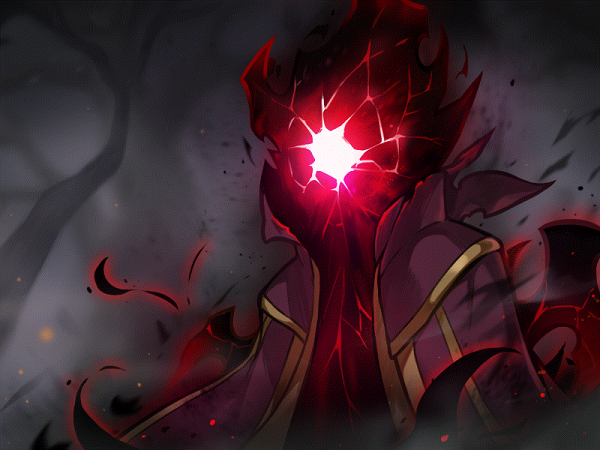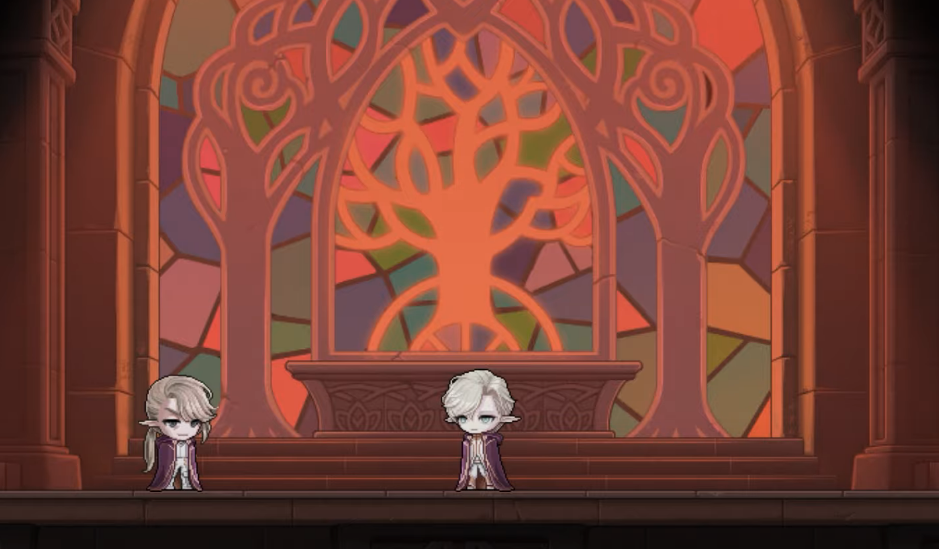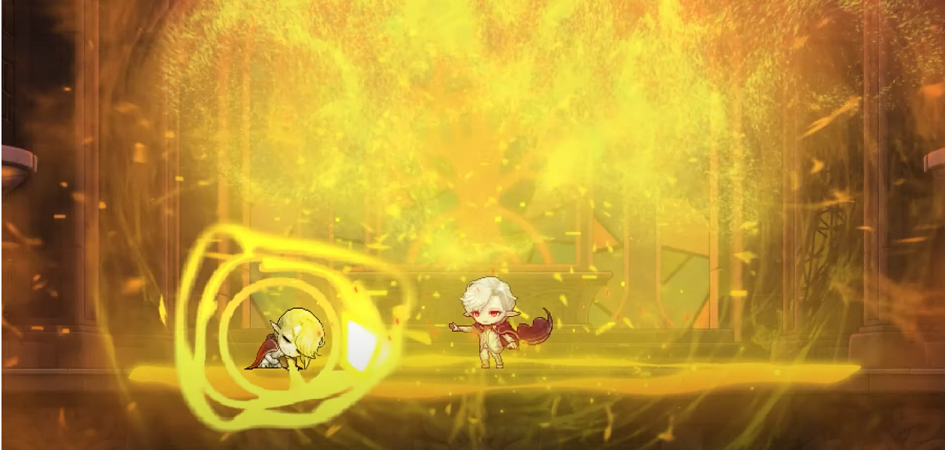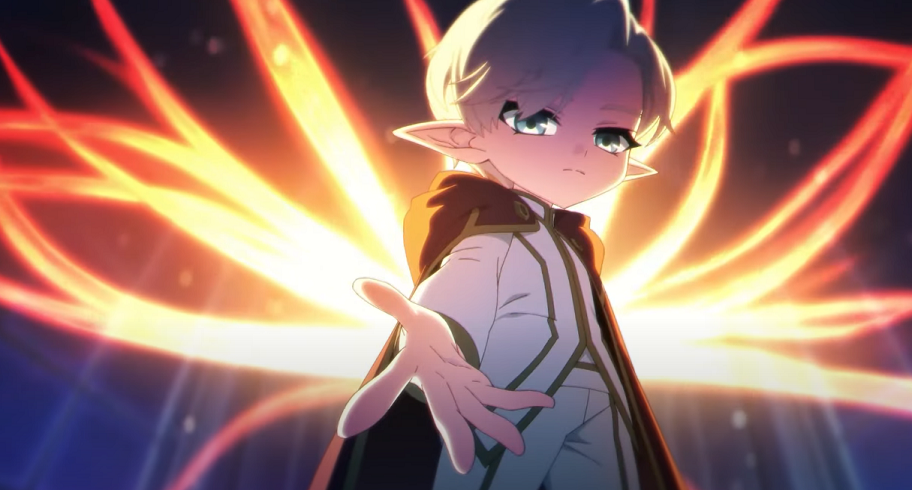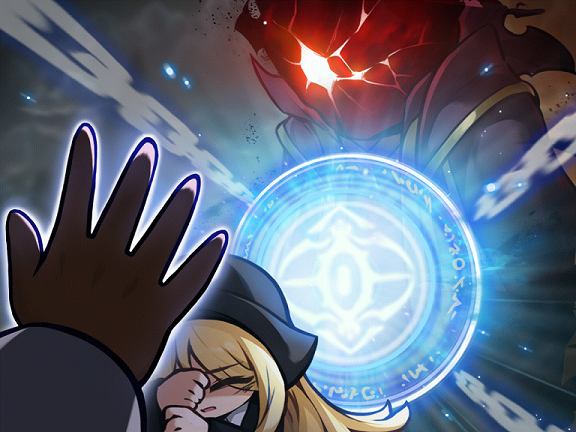
PREVIOUS
NEXT
PART I: BEFORE THE SEALING OF THE BLACK MAGE
Chapter 3: Sefirot’s Gardener
(A/N: Sefirot’s Gardener is the first Grandis installment in the Grand Athenaeum, and it’s told from the perspective of Asha, the namesake gardener of the story. Unlike many other Grand Athenaeum adaptations, our character is physically changed to look like Asha, and we also have a small new subset of attack and movement skills to match.)
Around the time of the Flora schism, Sefirot - the sanctum of Grandis’ Transcendent of Life - was attacked by an unknown enemy, resulting in the deaths of countless guardians who fell while protecting the sanctum. Following this battle, the spirits of the fallen began haunting the sanctum, with the Monks of Life holding memorial services to put them to rest.
(A/N: In the Jewish Kabbalah, the Sefirot are the ten nodes on the Tree of Life, which represent encompassing aspects of existence, the divine, and humanity. Sefirot has a lot of parallels to Root Abyss, which was technically a sort of sanctuary for Alicia before Damien created the four Seal Guardians to keep her from leaving.
Root Abyss and Sefirot both have a large garden and bleak surroundings, with four unique regions in each direction. Whereas Sefirot alludes to the Kabbalistic Tree of Life, Root Abyss exists deep beneath the actual Tree of Life in Maple World - the World Tree, which is based on the World Tree of Norse mythology. Even some of the mob designs are slightly reminiscent of each other, such as the Root Abyss imps and the Sefirot spirits, both of which wield scythes.)
Furthermore, the Transcendent of Life seemingly disappeared from Sefirot, with their altar remaining locked and inaccessible. However, a stone tablet was left behind at the altar, which contained an encrypted message about how to summon the Transcendent of Life, to which the Monks of Life continued tending to the garden in Sefirot in the hope of bringing back the Transcendent to the sanctum, believing that keeping the garden alive and verdant would allow for the Transcendent’s return.
Because of the schism that tore apart the High Flora and Verdant Flora, the balance of life on Grandis was broken, causing Gerand Darmoor to awaken as the new Transcendent of Life, with the former Transcendent of Life and their monks disappearing from the sanctum, though it remained unknown how or why the Transcendent had disappeared. Nevertheless, Darmoor kept his awakening secret from the rest of his people, leaving the people of Grandis unaware that the former Transcendent of Life had disappeared from Sefirot, for which they continued visiting the sanctum in the hope of having the Transcendent grant their wishes.
As the God-King’s madness grew worse, he slowly began transforming into a twisted monster, rendering him incapable of speaking or even recognizing his people. In desperation, several Knights of the Einherjar began investigating the source of his insanity, which led them to realize that his affliction came from an illness. The knights began to secretly investigate a cure for his madness, but after finding no solution, they came to believe that the only way to save their king was through the blessing of the Transcendent of Life, for which they planned a secret expedition to Sefirot.
(A/N: The lore about Sefirot and the Transcendent of Life comes from Episode 7 of the Grand Athenaeum, Sefirot’s Gardener, which I’ll cover after this author’s note. This storyline gave a lot more clarity to Darmoor’s character and motivations, and it also retconned a few things, most of which I’ll mention later on. The biggest change, however, is that Darmoor was already the Transcendent of Life at the start of the schism between the High Flora and Verdant Flora. Pretty much every storyline before this one stated that Darmoor awakened as the Transcendent of Life during the final battle in the Flora Civil War at Aboris, which is when the balance of life was broken on Grandis.
However, this storyline reveals that Darmoor was already the Transcendent of Life then, which essentially makes it so that his ‘awakening’ at Aboris was a fake-out to make people think that he wasn’t a Transcendent throughout the civil war. This does lead to a bit of confusion because it was highly suggested that Darmoor manipulated events to incite the war so that the balance of life would be broken on Grandis, but it turns out that the initial schism is what broke the balance early on, despite it being a bloodless conflict.
The idea of Transcendents awakening in response to the balance of their domain being destroyed has been around since the Transcendents themselves were first introduced in Kaiser and Angelic Buster’s storylines. Disregarding the slight confusion introduced in this storyline, Darmoor’s awakening as the Transcendent of Life has always been depicted as being in response to the blatant disrespect for life from the carnage of war.
Similarly, the White Mage awakened as the Transcendent of Light as the light of the world faded away due to the destruction caused by the selfishness and greed that plagued Maple World. The idea that someone preceded the White Mage has never been addressed in the game before, and so most people formed their headcanons from the lore about Transcendents in Angelic Buster’s storyline, although this information has been removed from her story after her revamp.
That dialogue originally revealed two main things: that some Transcendents are made immortal, while some are born mortal and reincarnate, as well as the fact that Transcendents only awaken in response to an imbalance of their domain. Because of this, my working assumption had been that the position of mortal-born Transcendents can just go on remaining unfilled for centuries until the imbalance of their domain causes them to awaken and attain immortality, which would mean that the White Mage had no predecessor while the balance was kept.
However, the Sefirot’s Gardener storyline confirms that someone did precede Darmoor, which makes it likely that the writers are finally going to start addressing that elephant in the room, and possibly even add some more lore about the White Mage and the history of Maple World’s Transcendent of Light as a side effect of fleshing out the mechanics of mortal-born Transcendents. With the removal of Transcendent lore from Angelic Buster’s story, it seems that the writers are set to have a blank canvas for the new lore that they choose to create.
On a side note, Zero’s awakening was a weird case because Alpha and Beta were trapped in Mirror World for a long time, and they were unable to fully succeed Rhinne until Mirror World was destroyed. Immediately upon awakening, however, they used their power to recreate Mirror World, which severely weakened their full potential for as long as they keep maintaining it. Along with the fact that they’re frequently described as “divided and weakened”, it’s heavily suggested that Alpha and Beta don’t constitute as proper Transcendents, which explains things like why Maple World is described as being bereft of Transcendents after the Black Mage’s death, as well as things like why Alpha and Beta never seemed to meet or hear the Overseers like Aeona, Tana, the White Mage, and possibly Darmoor did.
Even though they don’t awaken traditionally like the other Transcendents we’ve seen, given how unstable the balance of time is in Maple World between the temporal collapse happening in Ludibrium, the Dimensional Schism created by Arkarium, and the Interdimensional Portals, it’s very apparent that a Transcendent of Time’s awakening was long overdue, and that it would’ve happened a lot sooner if the Black Mage hadn’t trapped Rhinne and Zero in Mirror World. Moving on, though, the stuff below here covers the events of Sefirot’s Gardener, which is told from the perspective of Asha, the namesake gardener of the story.)
In Sefirot, two peddler women arrived and encountered Asha the gardener tending to the flowers in the garden. One of the peddlers confronted Asha and demanded to know why the door to the altar wouldn’t open, adding that Asha herself had claimed earlier that they could meet the Transcendent of Life there. Asha patiently told the woman that her words were merely what had been written in the records, reminding the woman that she had already mentioned that the Transcendent of Life hadn’t appeared in the sanctum for some time. The other peddler asked Asha where they could find the Transcendent, to which Asha replied that she didn’t know.
The first woman then chided Asha, demanding to know how the presiding monk of the sanctum didn’t know where her own god resided. Just as Asha began explaining that she was only the gardener, the woman angrily slapped Asha across the face with her walking stick before asking whether Asha had any idea how difficult of a journey it had been to reach the sanctum, adding that she hadn’t come all the way just to speak with the gardener.
The peddler woman strikes Asha
She claimed that it had taken her three months to reach Sefirot, and that her daughter was dying as they spoke, adding that it would be Asha’s fault if her daughter were to die before the Transcendent of Life could grant her wish. Despite wincing from the blow, Asha stood her ground and reminded the woman that she was the one who had ignored her words about the Transcendent not being in the sanctum.
She added that the woman couldn’t save her daughter by taking her anger out on her, and she asked her not to desecrate the sanctum with her violent actions. She then told the woman to go back home, adding that she could still spend her daughter’s last moments together that way. Furious, the woman raised her walking stick to hit Asha again, but just as she did, she took a step back and accidentally stepped on the flowers in the garden.
Suddenly, Asha’s tone turned serious as she sternly ordered the woman not to touch the flowers. Surprised, the woman asked Asha why she was making such a fuss over such measly plants, but just as she continued stepping on them, Asha loudly warned her once again not to harm the flowers. Confused, but still angry, the woman asked Asha what was wrong with her, as she had been quiet and meek just a moment ago, adding that the flowers were worthless.
Asha retorted that they were no ordinary flowers, as the monks had told her that if the flowers were able to grow beautifully, the Transcendent of Life would return. Suddenly, four hooded High Flora – Prince Gerand Darmoor, the God-King of the High Flora, and two Knights of the Einherjar, Edvar and Yuel – arrived and overheard Asha’s words, causing them to realize that the Transcendent of Life wasn’t in Sefirot.
Upon seeing the visitors, the two peddlers recognized them as Flora and decided to leave immediately out of fear. Asha watched the two women leave, noting to herself that the Flora certainly had a fearsome presence to make the peddlers leave right away. She then told the High Flora that just as they had overheard, the Transcendent of Life was indeed not in Sefirot, adding that they could check for themselves at the altar. However, she noted that the altar was closed and that they would not be able to open it.
Asha meets Yuel, Edvar, the God-King, and Darmoor
Nevertheless, the High Flora decided to check the altar just to confirm, though Darmoor remained behind. Just as Asha wondered to herself why Darmoor hadn’t followed the others, Darmoor told Asha that he wanted to ask her something, noting that the flowers were quite beautiful. Asha asked Darmoor not to touch the flowers without her permission, explaining that the plants in the sanctum were fragile and could easily wilt.
She also told him that it would be best if he gave up on meeting the Transcendent, reminding him once again that she was merely the gardener and that she had no information about the Transcendent or their whereabouts. Upon hearing her words, however, Darmoor noted that it was all the better that he was speaking with the gardener, revealing that what he was interested in wasn’t the Transcendent, but the garden itself.
He noted that the garden was beautifully tended and asked Asha whether she took care of it all on her own. When Asha told him that she was indeed the sole caretaker, Darmoor noted that Asha was quite incredible. Asha replied that the garden was once in an even grander state when the monks had tended to the sanctum, with the entire place being full of life and breathtakingly beautiful. She then asked Darmoor who he was, as most visitors were so preoccupied with the altar that they paid no attention to the garden. She explained that it was her first time seeing someone take an interest in it, to which Darmoor pulled back his hood and told her that his name was Aaron.
(A/N: Please note: the following text contains major spoilers for the Cernium storyline. If you don’t want spoilers, skip to the end of the author’s note.
When we met Darmoor in person for the first time in the Cernium storyline, Darmoor disguised himself as a High Flora turncoat and used the alias of Aaron to hide his identity. The Sefirot’s Gardener storyline confirms that he’s been using this fake name for a long time now. For the sake of consistency with the storyline, I’ll switch over to referring to Darmoor as Aaron for as long as he’s still in disguise.)
Aaron then asked Asha what her name was, to which Asha merely told him that he could just call her the gardener, as he likely wouldn’t be staying long without the Transcendent anyway. However, Aaron revealed that his goal wasn’t to meet the Transcendent, though he remained coy when Asha asked him what he really wanted.
Aaron asked Asha whether she was waiting for the Transcendent as well, and whether that was the reason why she tended to the garden so tirelessly. Asha told him that it wasn’t the reason why she stayed, explaining that she wasn’t even a monk, and that she had never met the Transcendent before, despite having lived in Sefirot all her life. Aaron told Asha that, unlike himself, his companions strongly wished to meet the Transcendent, and that he wished to check on whether they had managed to summon them. Promising to speak with her again, Aaron set off towards the altar where the Transcendent was said to reside.
Meanwhile, Edvar, Yuel, and the God-King arrived at the altar, where Edvar expressed his relief at finally arriving. He noted that it hadn’t been an easy journey, thanks to the barrier surrounding the sanctum. He then wondered whether it would truly be possible to cure the God-King’s madness, which was so severe that even the greatest minds could find no solution.
Yuel, Edvar, and the God-King arrive at the door to the altar
Yuel replied that they had no other choice, as the God-King’s violent tendencies had become so strong that he couldn’t even recognize them anymore. She noted that the only possible solution left was to use the power of a Transcendent. Edvar replied that he felt uneasy about leaving the palace empty at such a moment, to which Yuel asked him whether he felt uneasy because of the Verdant Flora. She explained that she doubted that they would invade the capital in their absence, adding that she had even heard of a rising divide within their ranks.
However, Edvar told her that the Verdant Flora weren’t the problem, pointing out the state of the Knights of the Einherjar. He noted that with just a single word of dissent from Adelaide, all of her comrades had also refused to follow the God-King into battle. He added that with their most prominent knight imprisoned, the advancement of their forces had been delayed indefinitely, which had made a complete mess of their plans.
Yuel pointed out that, to be exact, it had been the God-King who had ordered her imprisonment, adding that they all had been shocked by his sudden change, including herself. She noted that his plan to recklessly expand their military and subjugate all of Grandis was too far-fetched a strategy, and that the God-King would never have ordered such a thing if he were in his right mind.
Edvar noted that it was the toll that the God-King’s madness had taken on him. However, he added that turning one’s back upon their master simply because of his change was the height of disloyalty, especially for a Knight of the Einherjar. Yuel replied that it was only recently that they had discovered that his condition was an illness, adding that the other knights would see reason and return to his side after he was cured.
Edvar noted that the other knights had better return, or else they would have another mess on their hands. He added that while the God-King’s stand-in held the fort down, they would cure the God-King by meeting the Transcendent of Life. He and Yuel then attempted to open the door to the altar, which remained firmly shut. Unsure of how they could open it, Edvar suggested speaking with Asha, believing that they could force the information out of her if she was concealing it.
Just then, Aaron arrived to check on their progress. Immediately upon his arrival, however, the door to the altar began glowing brightly and swung open. (A/N: This was meant to be foreshadowing in the Sefirot’s Gardener storyline that Darmoor was already the Transcendent of Life at this point.) Though the knights were surprised, they nevertheless proceeded inside and arrived at the altar. There, they found that the altar was completely deserted, just as Asha had said. Refusing to return home empty-handed, the knights began to search the altar. Aaron then pointed out a stone tablet in the corner of the altar, with strange drawings carved into it.
The empty altar of the Transcendent of Life
Edvar recognized the tablet as a cipher, explaining that solving them typically led to treasures or powerful spells, though in this case, he believed that it would allow them to summon the Transcendent of Life. Upon examining the tablet, he noted that it seemed to represent Sefirot, which meant that they would need to investigate the sanctum to find the answer. Yuel pointed out that it would be dangerous to be away from the capital for so long, which meant that they needed to solve it as soon as possible. As it could take quite a long time to solve it by themselves, Edvar suggested that they enlist Asha’s help, as she would be very familiar with all the hidden parts of the sanctum.
Back in the garden, the knights showed Asha the stone tablet which they had found inside the altar. Asha was shocked to know that they had managed to open the door, though Edvar told her that the important part was that the tablet had the power to summon the Transcendent. Though Asha was hesitant to believe it, she noted that the knights seemed to be special if they had been able to open the door to the altar. She then agreed to help and asked them what she should do. Aaron told her that he had a great interest in ancient documents, and that he had a sizable knowledge about ciphers, which he believed would be useful on their mission.
(A/N: Please note: the following text contains major spoilers for the Cernium storyline. If you don’t want spoilers, skip to the end of the author’s note.
This is another reference to the Cernium storyline, in which Darmoor – disguised as Aaron – spent years meticulously deciphering and organizing the ancient texts in the Cernium Royal Library, many of which contained information about the Ancient Gods.)
The stone tablet with a picture cipher
Noting that it wouldn’t be particularly dangerous, Aaron suggested that they split up. After Edvar and Yuel headed off to investigate, Aaron asked Asha whether she was ready to go. Asha noted that she was surprised, as Aaron seemed to be of higher status than the knights, which meant that he could have simply left the task to his subordinates. Aaron explained that he was a very curious person and that he wished to solve the cipher himself. He also added that what he was more interested in than the solution was the process of solving it. He then noted that Asha seemed to be quite interesting as well, as she was able to speak plainly with him, even after knowing of his higher status, which made him wonder what gave her such courage.
Asha explained that it wasn’t courage, but rather, she believed that everyone – even the Flora or those with high statuses – had equal existences as living things. She added that it was meaningless for her to bother with who was ‘higher’ or ‘lower’, though she noted that her opinions might bother a Flora like himself. To her surprise, however, Aaron told her that he actually agreed with her, as status had no meaning to him, with even a king being nothing special at all. At Asha’s confusion, Aaron merely suggested that they begin to head out to solve the cipher. Asha then told him that she had brought a map of the sanctum, explaining that Sefirot consisted of the garden at the center, as well as a forest surrounding it on all sides.
Aaron asked her whether there was anything near the garden that might have something to do with the tablet, to which Asha replied that she couldn’t think of anything, adding that since the garden was under her care, she would have noticed if there was something. Aaron noted that it meant that there was a high chance that the sanctum outskirts were where they’d find answers. Asha explained that the outskirts were practically in ruins, as no one had tended to them in a long time. She added that there were also monsters there, though there were also a few barrier stones which had been created not so long ago. Upon hearing that there were monsters, Aaron offered to go himself if it was too dangerous for her, though Asha told him that she would be able to handle the monsters herself.
Asha then led Aaron to the northern outskirts of Sefirot, which Aaron noted was a bleak and desolate place. He then noticed an owl-shaped statue, which Asha explained was one of the four barrier stones that kept the barrier around Sefirot in place. She added that according to the monks, the barrier stones were the reason why Sefirot was hard to detect from the outside. Upon examining the barrier stone, Aaron found a slot that appeared to be the same size as the stone tablet. After placing the tablet in the slot, writing appeared on the stone statue: “Come to me with cold warmth”. Asha was confused by what ‘cold warmth’ meant, to which Aaron explained that it seemed to be a metaphor for something.
The stone tablet fits in the barrier stone’s slot
Suddenly, Orange Lantern Nightghosts appeared and surrounded them both. After escaping to a safe place, Aaron asked whether the spirits always appeared in the area, noting how fascinating it was that there were monsters in the Transcendent’s sanctum. Asha explained that the spirits weren’t always monsters, but rather, they were the souls of those who had died protecting the sanctum from outsiders.
She explained that when the monks were still around, they had kept the spirits at bay by holding memorial ceremonies for them, though without the monks to conduct the rituals, the spirits wandered around freely. However, she added that she had never seen so many appear at once, as it was usually just one or two of them.
Orange Lantern Nightghosts surround Aaron and Asha
Aaron noted that it seemed as if they had made a pledge to appear at a certain time, which he supposed was a response to the tablet. Realizing that the spirits themselves were a clue, Asha explained that the eastern outskirts housed spirits carrying orange lamps, while the spirits in the western outskirts held blue lamps. She then told Aaron that the ‘cold warmth’ could refer to the Blue Lantern Nightghosts.
Praising Asha for her excellent deduction, Aaron suggested that they gather the blue flames from the lanterns. After they gathered the flames, Asha noted that the lamps were essentially the cores of the spirits, which contained the emotion that they had felt most strongly when they had been alive. She explained that those who had died protecting the sanctum with fear had that fear turned into blue flames, while rage had become the orange flames. Aaron observed that the blue flames were not hot to the touch, which lined up with the description of ‘cold warmth’. Asha then placed the flames before the barrier stone statue, causing a portion of the tablet to light up with color. Aaron realized that they would soon be able to find the answer if they continued filling up the tablet.
Asha noted that though it may be a coincidence, the carving of the Blue Lantern Nightghost was on the east side of the tablet, which may be helpful to keep in mind. Just then, the statue turned itself towards the west as the words on the tablet changed to say: “You who solved the first riddle, I shall guide you down the next path.” Asha then suggested that they head to the western outskirts, where she placed the stone tablet in the slot within the barrier stone statue.
The first riddle in the cipher is solved
Upon doing so, the words on the tablet changed to say: “Come to me with the augury hidden in earth warmed by the sunlight. That earth rests beneath your feet.” Aaron and Asha together realized that both ‘earth warmed by sunlight’ and ‘that earth rests beneath your feet’ referred to the south, and so they decided to head to the southern outskirts. There, Asha found several hidden amulets, which she brought back to Aaron, who noted that, though the tablet had described them as a hidden treasure, the amulets didn’t appear to be anything special. Asha explained that the amulets had been created for those who had died protecting the sanctum in the hopes that such a tragedy would never happen again.
Aaron noted that there seemed to have been a large number of casualties, to which Asha explained it was said that it was the very reason why Sefirot had been hidden behind a barrier. Aaron then wondered why, of all the possible ciphers, the ones who had created it had chosen this one. Nevertheless, he suggested that they continue solving it. Asha placed the amulets at the foot of the barrier stone statue, causing another part of the tablet to immediately change color, while the statue turned itself north. Asha noted that the colored portion was the picture of the amulets on the west side of the tablet, while the words on the tablet had changed to say: “You who solved the second riddle, I shall guide you to the next path.”
The second riddle in the cipher is solved
After arriving at the northern outskirts, Aaron noticed several Hollow Scarecrows and wondered whether they had anything to do with those who had died protecting the sanctum. Asha explained that the scarecrows were guardians who had protected the sanctum from the outside. After the monks had disappeared, the scarecrows – upon losing the thing which they had been made to protect – had been turned into ordinary monsters.
Asha then placed the tablet into the barrier stone statue, causing the words on the tablet to change into: “Come to me with the screams of one who has stood on empty ground.” Asha realized that the words likely referred to carrying the sound of screams in their memories, which meant that they would need to defeat the Hollow Scarecrows and hear their screams.
After defeating the monsters, the scarecrow drawing on the tablet began glowing, while the statue remained facing south. Though Asha realized that they needed to head to the southern outskirts, she remained in place, deep in thought. When Aaron asked her what she was thinking about, Asha explained that she had been thinking about how he had been wondering why the ones who had created the tablet had chosen such a cipher.
The third riddle in the cipher is solved
She explained that after thinking about the actions which they had to do – gazing upon the emotions of the spirits, taking care of the amulets made to comfort them, and laying the guardians to rest after their purpose had been lost – she had realized that they were all actions that reflected upon those who had sacrificed their lives for the sanctum. She explained that the ones who had created the cipher had wished for the Transcendent of Life to remember those who had been sacrificed.
Her words caused Aaron to note that everything had been done in service to those who had been sacrificed, adding that her theory indeed seemed to be the case. He also noted that the Transcendent of Life must know how selfish the living could be, and how living things would drag others down in order to protect their own worthless lives.
However, he believed that those who had died for the sanctum must not have made a true sacrifice, as they had left malicious spirits behind when they had departed the world. He noted that it was difficult for one to lay down their life for something without regret, such that no part of them would remain after they were gone. He added that only a handful of people would be capable of making such a choice.
After a pause, he apologized for rambling and asked Asha to place the tablet into the statue. Upon doing so, the words on the statue changed to say: “You already know this answer. Carry out that which you know must be done, and return to me.” Realizing that the orange flames were the last uncollected things left, Asha and Aaron traveled to the northern outskirts, where they collected the orange flames and brought them before the barrier stone statue.
Immediately, the final picture in the tablet was colored, though nothing else happened afterwards. Aaron was surprised, as he had expected something to happen after solving the cipher. Just then, the words on the tablet changed once again into, “This is not the end. Rely on your own strength to find the last key.” Aaron realized that there must be a fifth riddle to solve, and upon seeing that the statue had turned towards the garden, Asha realized that the final key had to be there, though she noted that there was no barrier stone statue in the garden.
The fourth riddle in the cipher is solved
Nevertheless, the pair decided to return to the garden, where Aaron noted that Asha had once mentioned that there had once been Monks of Life in Sefirot in the past. Asha explained that there were once many monks who had taken care of the sanctum, which had been much more beautiful back in those days, as a result, with the garden being much larger and more spacious as well.
When Aaron asked how she alone remained, Asha told him that the monks had all suddenly disappeared one day, as though they had never existed at all. Aaron asked whether the monks had died, to which Asha explained that the monks were spirits which had been created from the Transcendent of Life’s power, which meant that they weren’t beings who could die like ordinary life forms.
She added that in the past, she had thought that the Transcendent of Life may have disappeared as well if the monks created by them had vanished. However, she also noted that she had never seen the Transcendent of Life, even when the monks had been around, and so she couldn’t be sure. She explained that she had been left with no choice but to take care of the sanctum alone, and because of the impossibility of having to do it alone, she had been forced to make the garden smaller so that she could take care of it by herself.
Aaron admitted that the remaining part of the garden seemed quite wonderful, and that it even seemed more beautiful because of its downsizing. Asha agreed, adding that she had done a bit of pruning, explaining that in order to raise a plant properly, one couldn’t just treat it with kindness, as they needed to be able to ruthlessly cut away the useless parts, leaving only what was most important if the plants were to grow beautiful and strong. She explained that if one let the useless parts remain as they were, it could hinder the plant’s growth, or even kill it.
Aaron quietly pondered her words, thinking about what she had said about leaving only the things that had value, adding that her thoughts lined up with his. He explained that pruning was an important job to undertake, not only in the garden, but elsewhere as well. He then noted that the sun was about to set, and he suggested that they finish up for today.
The pair then returned and met with Yuel and Edvar, who asked them where they had been. Yuel explained that they had discovered another barrier stone statue near the altar, and that they believed that it may be helpful in solving the cipher. Asha immediately realized what they were referring to and explained that it likely had nothing to do with the cipher.
After arriving at the altar, Aaron read the inscription on the statue, which said, “Those on the outskirts gaze now in the proper direction and have thrown open the exterior gate. The path below it shall guide you down the mountain.” Asha explained that the statue was an emergency exit, which could lead them down the mountain. Yuel apologized that the statue had nothing to do with the cipher, though Aaron told her not to be sorry, as it may be useful to have an emergency exit. He then suggested that they turn in for the night, believing that they may have better luck tomorrow.
Soon after, Asha returned to the garden, as she hadn’t been able to water the flowers because she had been busy solving the cipher. As she began watering the flowers, the God-King silently entered the garden, leaking black smoke from his robes. From the gap within his robes, he began draining the mana from the flowers into himself, much to Asha’s shock.
The God-King absorbs mana from the flowers
As he did, his robes began tearing, revealing a monstrous head glowing with red and black energy, as well as dark tendrils peeking out from the foot of his robes. Asha immediately attempted to stop the God-King, though none of her attacks had any effect. Defeated, Asha collapsed on the floor as the God-King growled mindlessly. As he began approaching her, Asha expressed her relief that she had been able to get him to attack her and leave the flowers alone. Suddenly, Aaron arrived at the scene and used his powers to seal the God-King away.
(A/N: The seal which Aaron uses has the same symbol as the Transcendent of Life symbol on Zero’s 5th job skill called Transcendent, which is another hint that Darmoor is already the Transcendent of Life at this point. The seal that he uses is also extremely similar in aesthetic to the Seal of Time that the Heroes used to seal the Black Mage away.
The God-King’s appearance is highly reminiscent of Specters, and given the importance of Specters in the continental Grandis storyline, it’s very likely that Darmoor may have infected his father with a Specter soul. Given that Specters are creatures which abhor humanity, it’s possible that the Specter’s influence led to the God-King’s desire to begin a war against Grandis, eventually consuming him and taking over his body.)
Aaron saves Asha from the God-King
Just then, Yuel and Edvar rushed to the scene, where they were shocked to find the God-King being sealed away by Aaron, whom they called the prince. As Asha lost consciousness, she managed to overhear Yuel referring to the monster as the God-King and Aaron as their prince. After she passed out, Edvar expressed his surprise that the God-King had managed to escape, as he was supposed to be inside the annex. Yuel realized that he must have managed to escape while they had all been preoccupied.
Edvar then noticed Asha passed out and realized that she had seen the God-King in his monstrous state, which meant that they had no choice but to kill her. However, Yuel pointed out that they still needed Asha to solve the cipher, to which Edvar decided that they would keep her locked up in the annex until she finished helping them, after which they would kill her, just like all the others who had witnessed the God-King’s true madness.
Yuel then began carrying Asha to the annex, though Aaron remained in place and began observing the area. He noted that the God-King had become extremely sensitive to mana as a result of his madness, which made him wonder why he would come to the garden when there should be no traces of mana in a sanctum bereft of its Transcendent.
Though Edvar speculated that it was because the God-King was not in his right mind, Aaron began observing the garden and noticed the wilted flowerbed nearby. He noted that the flowerbed was right where the God-King had been standing, and since it was highly unlikely that Asha would have let a single flower wilt under her care, he concluded that the flowers, along with all the other plants in the garden, were imbued with nearly imperceptible mana.
Edvar realized that the plants being imbued with mana would be quite troublesome for them, as they needed to stay in the sanctum until they could solve the cipher, yet they were surrounded by things that would agitate the God-King. He pointed out that if the God-King were to absorb any more mana, his madness would only grow worse. Aaron suggested that they focus on isolating the God-King by raising another anti-mana barrier around the annex where the God-King was being kept.
Meanwhile, Asha awoke in the annex and found herself trapped in a cage. Aaron greeted her and told her that he was glad that she was unharmed. Asha immediately asked him whether the flowers and the garden were alright, to which Aaron told her that though a few flowers had wilted, the rest were still unharmed.
Aaron meets with a captured Asha
When Asha expressed her relief, Aaron noted that it was curious that the first thing that she thought about upon awakening was the safety of the garden, as well as the fact that she had confronted a monster far beyond her strength, which led him to believe that she considered the garden’s safety far more important than her own.
Asha replied that, though it sounded strange, the garden was more precious to her than anything. She explained that she was an orphan from the countless wars that plagued Grandis and that she had always considered herself to be just another worthless war orphan. She told Aaron that the monks of Sefirot had found her starving on the streets and that they had named her and taught her how to survive. Following this, she had chosen to follow the monks and help them wherever they could, even though they hadn’t asked her to do so.
She explained that the monks had told her that if the garden grew beautifully, the Transcendent of Life would return to the sanctum, which was why both she and they had put all their effort into tending the garden, eventually leading to her becoming Sefirot’s gardener. Eventually, however, the monks had all vanished mysteriously, and with them being her entire world, she had been left completely alone.
The Monks of Life save Asha
Asha becomes the gardener of Sefirot
Nevertheless, she had continued doing what she had promised to do, as there was nothing else that she could do. Hanging onto the monks’ words, she had continued tending to the garden in the hope that when the Transcendent of Life returned to the garden, the monks – who had been created from the Transcendent’s power – might return as well, which would mean that her miserable life would finally have some meaning.
After hearing her story, Aaron asked her whether she would continue to protect the garden, even if it led to her death. Asha immediately told him that she would, without hesitation, to which Aaron paused for a moment before warning her that her life was in danger. Asha asked whether it was because she had learned about Aaron and the monster’s identities as the prince and the God-King, which Aaron confirmed.
He explained that he and his comrades had come to Sefirot in order to restore the deformed God-King to his old self by borrowing the power of the Transcendent of Life, and that neither the Gods of the High Flora nor the Knights of the Einherjar knew the truth. He added that no one could know the truth, and that those who did must be killed immediately.
When Asha noted that they still needed her to solve the cipher, Aaron revealed that he had already solved the final part himself. He noted the riddle – “This is not the end. Rely on your own strength to find the last key” – as well as the statue pointing towards the garden, and the monks’ words about the Transcendent of Life only returning if the garden is well tended for, had made him realize that the statue was pointing towards the plants in the garden, whose mana was the key to solve the cipher.
He then showed her the tablet, which had absorbed the mana of the flowers, and pointed out a new glowing sentence upon it: “Only the beautiful sacrifice of a noble life will draw his gaze.” Asha told Aaron that she had no idea that the flowers were the answer, despite having tended to the garden for her entire life.
The final riddle inscribed on the tablet
She realized that the flowers in the garden had been prepared for the sake of those who got sacrificed, and she was relieved to know that there had been a purpose in her tending to the garden. However, she then realized that with the cipher solved, Aaron had no use for her, and she asked whether he planned to kill her.
To her surprise, however, Aaron revealed that he had no wish to kill her, as she was quite an interesting person to him. He suggested that she escape the sanctum while she could, forget everything that she had seen, and start a new life, adding that she should be able to escape unnoticed with her knowledge of the sanctum. He then unlocked Asha’s shackles and told her to run away once the chaos outside died down, bidding her farewell.
After freeing Asha, Aaron traveled to the entrance to the altar, where he met with Edvar and Yuel, who had just finished setting up the barrier for the God-King. Aaron then revealed that he had finished solving the cipher and showed them the words upon the stone tablet. He explained that the ‘beautiful sacrifice of a noble life’ had to refer to the sacrifice of a Flora – a superior race – and that, in particular, it had to refer to the sacrifice of a Flora knight.
He noted that they couldn’t return empty-handed, nor could they hide the God-King’s madness forever, adding that it must have been discovered that both Edvar and Yuel had disappeared from the capital. He then told them that they needed to decide among themselves which of them should be sacrificed for the sake of the God-King.
Immediately, Edvar and Yuel opened their wings and began to duel with their swords. As they locked blades, Edvar noted that Yuel – as one who had gained the God-King’s favor at such a young age – would be perfect for the role of a ‘noble sacrifice’, though Yuel immediately retorted that Edvar would be a better fit, as he had been born into an old, noble family which had served the God-King faithfully for countless years.
However, Edvar claimed that he hadn’t earned any of it, as he had simply been born into that life. He also noted that a noble knight would never point their blade towards their junior like he was doing, adding that even a Transcendent wouldn’t accept his life as a sacrifice. Dropping the pretense, Yuel admitted honestly that she had young siblings at home who would starve to death if she were to be killed, to which Edvar also replied that he had a wife and children who would die without him.
Edvar and Yuel fight to determine which will become the noble sacrifice
Suddenly, the two stopped fighting as they heard the sound of intruders outside the sanctum. Aaron ordered them to lay down their swords for now while they investigated the intruders, as it wouldn’t do for them to find the God-King. Outside the sanctuary, the knights discovered that several Verdant Flora had gathered at the outskirts.
Though they were surprised to find that the Verdant Flora had found their way to the sanctuary, Yuel noted that they were few and unarmed. Nevertheless, Edvar suggested that they keep their guards up. The knights confronted the Verdant Flora, who were astonished that the High Flora knights really were there as they had been told. They assured the knights that they had no desire to fight, as they had come to see the God-King.
A surprised Edvar whispered to Yuel, wondering how the Verdant Flora could have known that they would be at the sanctum, and whether there had been an intel leak somewhere. Yuel whispered back that they ought to go along with what the Verdant Flora were saying for now, after which she demanded to know why they sought the God-King.
One of the Verdant Flora explained that they had come to realize that their decision to split into different races was a mistake, and that they sought to return to the High Flora in order to follow their ways once again. Yuel and Edvar began whispering amongst themselves once again, realizing that the Verdant Flora were only groveling to regain their magic, adding that it was quite a sorry sight.
Yuel and Edvar confront the Verdant Flora at the entrance to Sefirot
However, Edvar noted that the Verdant Flora’s arrival came at an opportune moment for them, causing Yuel to realize that he meant that the ‘noble sacrifice’ didn’t have to refer to a Flora knight, as any Flora ought to be sufficiently noble. Edvar then asked the Verdant Flora whether they were willing to sacrifice their lives for the God-King, which they immediately agreed to.
(A/N: Something I find interesting is that the Verdant Flora, despite being looked down on for their lack of magic and treason, are still considered to have enough worth to constitute as a superior life form, showing that the High Flora still consider the Verdant Flora to be Flora, despite their social schism.)
Satisfied, Edvar unsheathed his sword and declared that he would make good on their claim by taking their lives. Yuel followed suit, with both of them opening their wings and cutting down one of the Verdant Flora, while the others began running away in fright. As they began retreating, the Verdant Flora came to believe that the information about the God-King being at Sefirot must have been false information meant to lead them into a trap, as there was no way that the God-King would come to such a desolate place.
Suddenly, however, they stopped as Aaron and the God-King appeared before them. Aaron then told them that the God-King whom they were seeking was standing right before them. Upon sensing the Verdant Flora’s mana, the God-King immediately began to drain their power, resulting in their deaths. Aaron then disappeared, leaving the God-King to go on a rampage alone.
Soon after, Edvar and Yuel arrived at the sight of the God-King finishing off the Verdant Flora. Yuel realized that the God-King must have escaped while the barrier had been weakened during their battle and began rushing to stop him. However, Edvar stopped her and told her to think carefully, noting that there was nothing that they could do to stop the God-King from absorbing the mana from the Verdant Flora. He then asked whether she could truly call a mindless monster who couldn’t even tell friend from foe, or even recognize his loyal knights, a king.
Though Yuel was enraged by Edvar’s treasonous statement, Edvar told her to think, pointing out that even if they brought the God-King back to the garden, they still needed a sacrifice to cure his madness. He asked Yuel whether she would really sacrifice her own life for someone like him, adding that he had no desire to do so.
He explained that he intended to run away, noting that they had hidden their identities before leaving the capital, which meant that they wouldn’t be exposed, even if an investigation were made. He told Yuel that they simply needed to set fire to the sanctum and erase any evidence of their presence, which would mean that the Verdant Flora would be blamed for turning the God-King into a monster. He added that he wouldn’t make her escape with him, though he declared that he was leaving, as he would just get killed by the God-King if he were to stay.
After Edvar fled the scene, Yuel approached the God-King and attempted to get him to recognize her in order to calm him down. However, the God-King merely growled and unleashed his power, causing Yuel to realize that he had gotten even more powerful after absorbing the Verdant Flora’s mana. Meanwhile, in the garden, Edvar noted to himself how foolish Yuel was, as she could have escaped with him when she had the chance. Nevertheless, he decided that he would burn down the garden to erase any evidence of his presence. He also resolved to kill Asha before he left, as well as Darmoor if he could.
Just as he began to set fire to the garden, however, Asha – who had escaped from her prison – discovered what Edvar was doing and attempted to stop him. However, Edvar merely struck Asha hard and caused her to fall to the ground. Though he wondered how Asha had managed to escape, he decided that it didn’t matter, as she had simply saved him the effort of searching for her.
He then opened his wings and prepared to unleash a flame spell to burn down the garden. Though injured from Edvar’s blow, Asha begged him not to destroy the garden, as Sefirot was the sanctum for the Transcendent of Life. However, Edvar noted that there was no Transcendent in the sanctum, which made it completely meaningless.
He then added how preposterous it was that the Transcendent of Life should demand a life to be sacrificed, believing that the entire place should just disappear. Though Asha begged him not to, Edvar used his magic to set the garden on fire, reducing all the plants to ashes. Asha then passed out, with Edvar leaving her to die in the fire.
Edvar sets the garden on fire
Elsewhere, Yuel saw the flames overtake the garden and realized that Edvar had set fire to the sanctum. To her shock, the God-King began to absorb the mana carried by the air from the burning flowers, causing him to transform into an even more monstrous form. Upon seeing him grow even more powerful, Yuel decided that she refused to be killed, as she had to live for the sake of her siblings back home.
Drawing her sword, she prepared to strike down the God-King, who unleashed a wave of dark energy that mortally wounded her. As she collapsed, her thoughts turned towards the God-King she remembered, begging him to spare her and entreating him to remember her again. However, the vision of the God-King in her mind was burned away, leaving her to stare at the monster which had once been her liege.
As the God-King towered over her, Yuel realized how foolish it was of her to think that a monster could recognize her, noting to herself that she should have run away when she had the chance. Nevertheless, she once again begged the God-King to spare her life, claiming that she couldn’t die in such a place, though the God-King, incapable of reason, simply finished her off.
The God-King becomes a complete monster
Meanwhile, Edvar attempted to flee the sanctum, but found that the exit – and the entire sanctum – had been blocked off. However, he then recalled that there was an emergency exit near the altar and rushed to find it. There, he was shocked to find that the door to the altar was ajar, and that there was a strange light pouring from it, causing him to wonder whether the Transcendent of Life had been summoned from the sacrifice of a noble life.
He then entered the altar, where he was surprised to find that there was no one inside and that the light had also vanished. He wondered whether there truly was no Transcendent of Life after all, though he noted that even if the Transcendent were to appear, it would be impossible to restore the God-King to his former state.
Suddenly, he turned to find Darmoor emerging from the shadows. He expressed his surprise that the prince had managed to survive, to which Darmoor asked him whether he was disappointed, since Edvar had wanted him dead. Edvar began stammering that he could never wish for such a thing, and that he was relieved to find the prince safe. He then asked Darmoor where he had been, to which Darmoor explained that he had been confirming something.
Darmoor confronts Edvar at the altar
At Edvar’s confusion, Darmoor told him that he had been confirming what determined a noble life, as he had been curious to see whether there were any lives noble enough to be considered special by the Transcendent of Life. However, he revealed that in the end, there were no noble lives, as everyone – Edvar, Yuel, and the Verdant Flora – had valued their own lives over everything else when it had mattered most, with none of them having the necessary resolve to truly sacrifice their entire lives for something.
A confused Edvar noted that it was natural for a living being to value their own life, to which Darmoor replied that though that was true, that was not the kind of being that he wanted. With his eyes glowing orange, he disdainfully noted that none of them had the right the summon the Transcendent of Life. At his words, Edvar slowly realized the truth and asked Darmoor whether he was the Transcendent of Life. He then asked when Darmoor had become the Transcendent in the first place.
Darmoor revealed that when the balance of life was broken, the Transcendent of Life would appear. He explained that he had already become the Transcendent of Life by the time that the war had started, though he then clarified that it was actually when the war had begun. Edvar realized that the war had begun because of the God-King’s madness, which made him wonder whether Darmoor had inflicted the illness upon his father.
(A/N: The ‘war’ that Darmoor refers to is pretty ambiguous at this point in time. Like I mentioned earlier, Darmoor already being the Transcendent of Life before the God-King’s madness was revealed in this storyline, as all prior storylines stated that he had awakened as a Transcendent during the final battle of the Flora Civil War. However, the problem is that there’s no war involving the Flora that took place at this point. The Flora Civil War started after the Verdant Flora were framed for the murder of the God-King, and the High Flora war of genocide began shortly after the God-King’s murder, as this storyline even confirms that Adele’s imprisonment delayed that war of conquest.
My current working headcanon is that this ‘war’ is basically the schism that took place between the High Flora and Verdant Flora, in which the God-King stripped the Verdant Flora of their magic and exiled them, which may have led to some sort of cold war between the two, as evidenced from Edvar’s belief that the Verdant Flora may attack the capital, which eventually did escalate into open warfare following the God-King’s murder.)
Darmoor noted that he had hoped to see something different upon becoming the Transcendent of Life, though he was ultimately wrong. He revealed that the arrogant High Flora and the Verdant Flora, who claimed to be different, were all ultimately the same. He then unleashed his Transcendent powers in a golden glow, fatally wounding Edvar. As Edvar begged to be spared, Darmoor replied that most lives had no value, and that Edvar’s life was amongst them. He then sardonically thanked Edvar for his hard work and wished him pleasant dreams before finishing him off.
Darmoor uses his Transcendent powers to kill Edvar
The next morning, as the sun arose, a mortally wounded Asha awoke to the sight of the garden in ruins. Asha was shocked to see her life’s work - which she considered to be her entire worth - had been reduced to ashes, noting that she had no purpose without the garden. Refusing to let it disappear, she recalled the words upon the stone tablet about how the beautiful sacrifice of a noble life could catch the Transcendent’s eye. Though she believed that her life was worth little, she noted that the Transcendent of Life was a benevolent god who treasured all life, which gave her hope that they would restore the garden.
She then forced herself to crawl to the empty altar, where she was distraught to find that the Transcendent of Life still hadn’t returned in the end. In her last moments, she prayed to the Transcendent, whom she called the only god that she knew, and begged them to restore the sanctuary in exchange for her miserable life. As Asha passed away, she heard Darmoor’s voice distantly calling her name.
In the ruins of Sefirot, Darmoor strode through the garden with his magnificent golden wings spread open. As he walked through the garden, his mere presence caused the burned plants throughout the garden to spring back to life. Declaring that he had finally found it, Darmoor entered the altar and used his Transcendent powers to bring Asha back to life. As Asha awoke, she opened her eyes to find Darmoor standing over her, holding his hand out to her. As she reached out to take his hand, Asha asked him why he had saved her, to which Darmoor told her that it was because she was the sole life in his sanctum with value.
Darmoor saves Asha’s life
(A/N: It’s very possible that Asha might be one of Darmoor’s Apostles. However, I personally believe that Asha is much more important to Darmoor than any of his Apostles. Based on the way that he holds disdain for many of his Apostles like Kaling and Limbo, I like to think that the fact that Asha is held in much higher regard than those Apostles means that she holds some higher position.
It’s revealed in the Shangri-La storyline that Darmoor is searching for an Adversary, and I feel like Asha is the candidate that he has in mind. Darmoor’s philosophy about pruning life and the idea of noble lives willing to cast their own lives aside for the sake of selflessness is almost the antithesis of the message of the Black Mage arc of the main story.
In the Arcane River storyline, the Adversary’s character arc revolves around their constant need to sacrifice themselves for the sake of other people, and this idea culminates in their choice in Limina. When the critical moment comes, the Adversary is told by Orchid that they need to channel their desire to end their own life for the sake of killing the Black Mage, but they ultimately fail to do so because the Seal Stone only responds to the strongest wish of the people, which is their desire for everyone - including the Adversary - to live.
It’s only when the player rejects their mindset that they have to kill themselves for the sake of everyone else and choose to live that the Seal Stone finally activates, allowing them to defeat the Black Mage. The message of the story is that our lives matter just as much as the people we care about, and that we shouldn’t minimize our own worth for the happiness of other people.
In a way, the Adversary is essentially everything that Darmoor despises. In his view, the Adversary was likely at their best when they were willing to end their life to stop the Black Mage, and their shift in mindset to prioritize their survival along with the world’s survival is seen as a betrayal of their original, ideal self.
You can even go as far as to say that the Adversary embodies the wishes of flawed, selfish people, and that in his perfect world, the Seal Stone would have responded to the Adversary’s desire to sacrifice themselves, as the life forms that he would have preserved all would have agreed that they should sacrifice their lives for the sake of protecting each other. I have a larger theory that his intention is for Asha to become an Adversary in order to destroy the Overseers, which I covered in the Shangri-La section and can be viewed here on Reddit.)
PREVIOUS
NEXT
